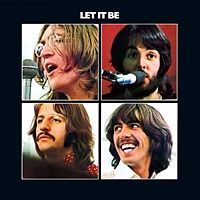Register / Create an Account
Let It Be (album)
From Beatles Wiki - Interviews, Music, Beatles Quotes
| “ |
I got back to England for Christmas and then, on January first, we were to start on the thing, which turned into Let It Be. And straight away again, it was just weird vibes. You know, I found I was starting to be able to enjoy being a musician, but the moment I got back with The Beatles, it was just too difficult. There were just too many limitations based upon our being together for so long. Everybody was sort of pigeonholed. It was frustrating. |
„ |
|
—George Harrison, from Mystical One: George Harrison: After the Breakup of the Beatles, Elliot J. Huntley, 2004
|
| “ |
We couldn't get into it. It was just a dreadful, dreadful feeling at Twickenham Studio. You couldn't make music at eight in the morning, in a strange place with people filming you, and coloured lights ... I was stoned all the time and I just didn't give a shit. |
„ |
|
—John Lennon, from "The Rolling Stone Interview", 1971
|
| “ |
It was a very tense period: John was with Yoko and had escalated to heroin and all the accompanying paranoias and he was putting himself out on a limb. I think that as much as it excited and amused him, at the same time it secretly terrified him. |
„ |
|
—Paul McCartney, Paul McCartney: Many Years From Now, by Barry Miles, 1998
|
| “ |
We were going to let it out in really shitty condition. I didn't care. I thought it was good to let it out and show people what had happened to us, we can't get it together; we don't play together any more; you know, leave us alone. The bootleg version is what it was like, and everyone was probably thinking they're not going to fucking work on it. There were 29 hours of tape, so much that it was like a movie. Twenty takes of everything, because we were rehearsing and taking everything. Nobody could face looking at it. |
„ |
|
—John Lennon, from "The Rolling Stone Interview", 1971
|
| “ |
When Spector came around, we said, "Well, if you want to work with us, go and do your audition." He worked like a pig on it. He always wanted to work with the Beatles, and he was given the shittiest load of badly recorded shit, with a lousy feeling toward it, ever. And he made something out of it. He did a great job. |
„ |
|
—John Lennon, from "The Rolling Stone Interview", 1971
|
| “ |
I had thought it would be good to let the shitty version out because it would break the Beatles, break the myth. It would be just us, with no trousers on and no glossy paint over the cover, and no hype: This is what we are like with our trousers off, would you please end the game now? But that didn't happen. We ended up doing Abbey Road quickly, and putting out something slick to preserve the myth. I am weak as well as strong, you know, and I wasn't going to fight for Let It Be because I really couldn't stand it. |
„ |
|
—John Lennon, from "The Rolling Stone Interview", 1971
|
| “ |
The problem was that John and Paul had written songs for so long it was difficult — First of all because they had such alot of tunes and they automatically thought that theirs should be priority. So for me, I'd always have to wait through ten of their songs before they'd even listen to one of mine. That was why All Things Must Pass had so many songs, because it was like I'd been constipated. I had a little encouragement from time to time, but it was very little. It was like they were doing me a favor. I didn't have much confidence in writing songs because of that. Because they never said, 'Yeah that's a good song.' |
„ |
|
—George Harrison, from Mystical One: George Harrison: After the Breakup of the Beatles, Elliot J. Huntley, 2004
|
